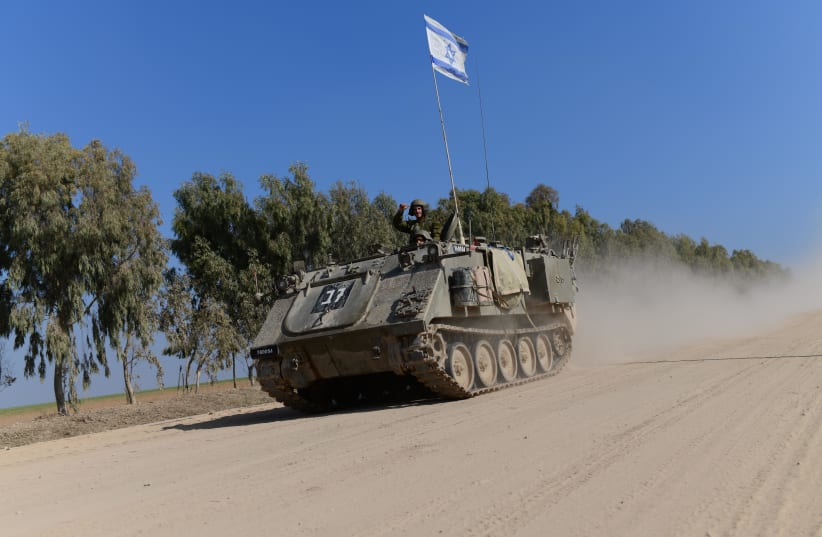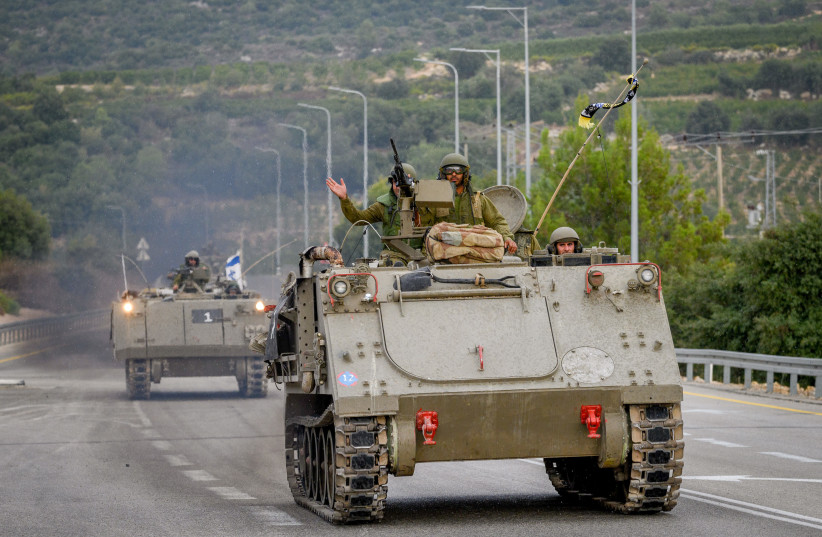IDF is using unmanned M113s in Gaza - report
The IDF has been rolling out, and using for the first time, a number of new systems, from new smart gun sights to precision mortars.
A report posted on social media claimed to show an unmanned Israeli M113 armored personnel carrier moving around in an area near Rafah. A video and accompanying photos showed the M113, which is considered an obsolete and old armored vehicle platform vulnerable to anti-tank weapons and RPGS, moving slowly in semi-urban terrain.
Other comments on social media said that the M113, which is also known as a “Zelda” in Hebrew, claimed the vehicle was unmanned and that this new technology had been used since the war began. Discussion on the social media platform X, formerly known as Twitter, say these unmanned armored personnel carriers (APCs) have played a key role in the battle for the Philadelphi corridor in Rafah, the area that runs for seven miles along the border of Gaza and Egypt. The unmanned APCs have been used to move further west along the corridor, extending operations towards the sea.
The IDF has been trying to find ways to repurpose the M113s for years. After 2014, it was decided to replace the aging system, which was first introduced in the 1960s. The vehicles are small, slow, and vulnerable to anti-armor weapons. However, they can be used in all types of auxiliary roles. For instance, they can be used in rear areas.
They can transport people. Israel has hundreds of active M113s and thousands in army depots that it can use, but the platforms are aging. Finding ways to make them relevant, rather than just let them collect dust, has been a challenge. One role for them was to put mortars on them so they could be used for firing 120 mm. mortars. Israel isn’t the only country trying to upgrade M113s. A report at Israel Defense earlier this year said Greece was turning to Israel to upgrade its own fleet of around 600 M113s.
Devices that can be operated using remote control
Back in January the website Globes noted that “there are devices that enable armored vehicles to be operated by remote control. One of them, manufactured by several companies including Elbit, is a system that is mounted on a heavy vehicle, like an APC, and with which you can be driven remotely. It’s a troop carrier without a driver, which has other things that a remotely piloted vehicle can be used for, especially in a terrorist-infested environment.” It is not clear if this is related to the latest reports on social media from Rafah.
Other countries have sought to turn their M113s into Remote Control Vehicles or Robotic Combat Vehicles. A report at the website Engineering.com noted in October 2023 “four defense contractors will each supply two working prototypes of remote control vehicles (RCVs, aka tank drones) to the US Army for three different types of tanks – one small and expendable version (RCV Light), a medium version (RCV-M) and a large version (RCV Heavy) – the latter an automated version of the M1 Abrams.”
Australia did the same thing, according to an April 2024 report at online Army Recognition. “Electro Optic Systems (EOS), a defense company based in Canberra, equipped the M113 APC with its R400 remote weapons system for the trials, which took place in the Puckapunyal Military Area. This initiative is part of a broader project by the army aimed at transforming the M113 APCs into autonomous or optionally manned combat vehicles, named M113 AS4.”
The War Zone website also reported in 2022 that “a photo posted to Twitter by Ronkainen shows what is identified as a version of BAE Systems’ Robotic Technology Demonstrator based on an M113 hull that has been cut down. The lower profile is evident because the engine hatch hinge is now above the top line of the vehicle.” This “uncrewed” vehicle showed up at the US Army’s EDGE 22 technology demonstration at Dugway Proving Ground in Utah.
The fact that the M113s have been reported spotted in the Rafah operation is also interesting, because the IDF’s new Eitan APCs, the super-modern wheeled replacement for the M113, has been active in Rafah as well with the Nahal brigade. The Eitan was developed to replace the M113 and it was first produced in 2020 and began to be delivered to soldiers in the fall of 2023, just before the war. The Eitan is a large-wheeled vehicle that looks futuristic and can carry 12 soldiers at speeds up to 90 kph, making it fast and manoeuvrable compared to older treaded APCs, like the IDF Namer, which is based on a heavy tank chassis.
The reports of the use of unmanned M113s is part of a much larger story about new technology in the Gaza war. The IDF has been rolling out – and using for the first time – several new systems, from new smart gunsights to precision mortars. Many of these technologies were already under development or had been deployed in their initial stations. The war has accelerated the need and use of these systems to protect soldiers and provide more information to commanders and more precision fire to eliminate threats.
Pud says we are now at war and must give our support to the IDF to do it's job and prepare to take the fight to Hamas, Hezbollah, Iran and the Antisemites of the Left worldwide.




No comments:
Post a Comment